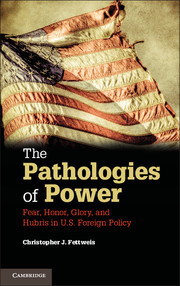Description
The Pathologies of Power
Fear, Honor, Glory, and Hubris in U.S. Foreign Policy
Author: Fettweis Christopher J.
Discusses how deeply held beliefs guide American foreign policy and identifies the foundations of those beliefs, explaining how they have inspired poor strategic decisions in Washington.
Language: English
Subject for The Pathologies of Power:
The Pathologies of Power
Publication date: 09-2013
315 p. · 15.2x22.9 cm · Paperback
Publication date: 09-2013
315 p. · 15.2x22.9 cm · Paperback
Approximative price 82.21 €
In Print (Delivery period: 14 days).
Add to cart
The Pathologies of Power
Publication date: 09-2013
320 p. · 15x23.1 cm · Hardback
Publication date: 09-2013
320 p. · 15x23.1 cm · Hardback
Description
/li>Contents
/li>Biography
/li>
The foreign policy of the United States is guided by deeply held beliefs, few of which are recognized much less subjected to rational analysis, Christopher J. Fettweis writes, in this, his third book. He identifies the foundations of those beliefs - fear, honor, glory and hubris - and explains how they have inspired poor strategic decisions in Washington. He then proceeds to discuss their origins. The author analyzes recent foreign policy mistakes, including the Bay of Pigs, the Vietnam War, and the Iraq War, and he considers the decision-making process behind them, as well as the beliefs inspiring those decisions. The American government's strategic performance, Professor Fettweis argues, can be improved if these pathological beliefs are recognized and eliminated.
Introduction: pathological beliefs in US foreign policy; 1. Fear: the power of nightmares in a safe society; 2. Honor: credibility, resolve, and paper tigers; 3. Glory: hypercompetitiveness and US foreign policy; 4. Hubris: the superpower as superhero; Conclusion: pathology, realism, and the future.
Christopher J. Fettweis is Associate Professor of Political Science at Tulane University. He is the author of Dangerous Times?: The International Politics of Great Power Peace (2010) and Losing Hurts Twice as Bad: The Four Stages to Moving beyond Iraq (2008).
© 2024 LAVOISIER S.A.S.
These books may interest you

Human Nature and the Causes of War 158.24 €

Human Nature and the Causes of War 116.04 €


